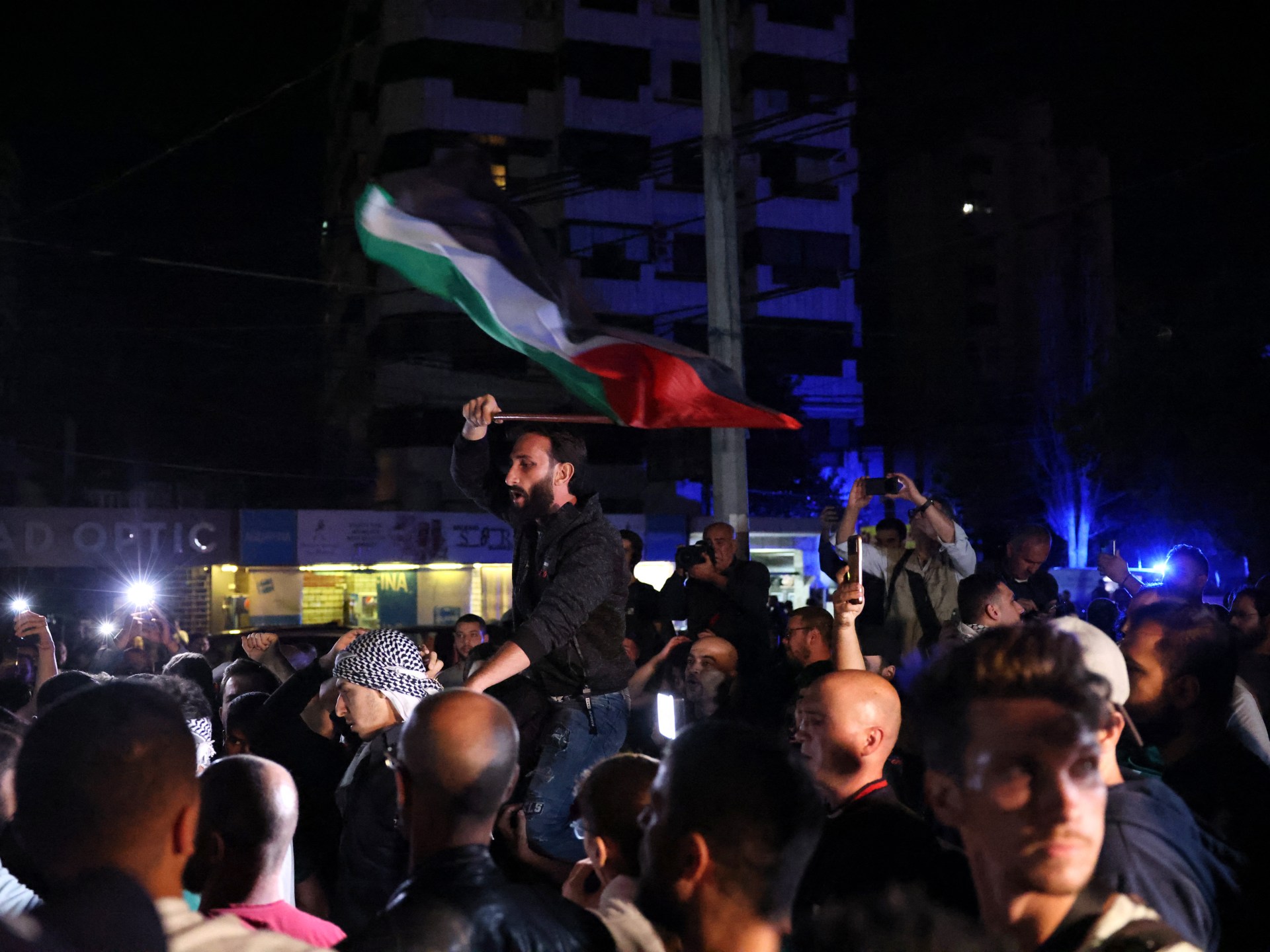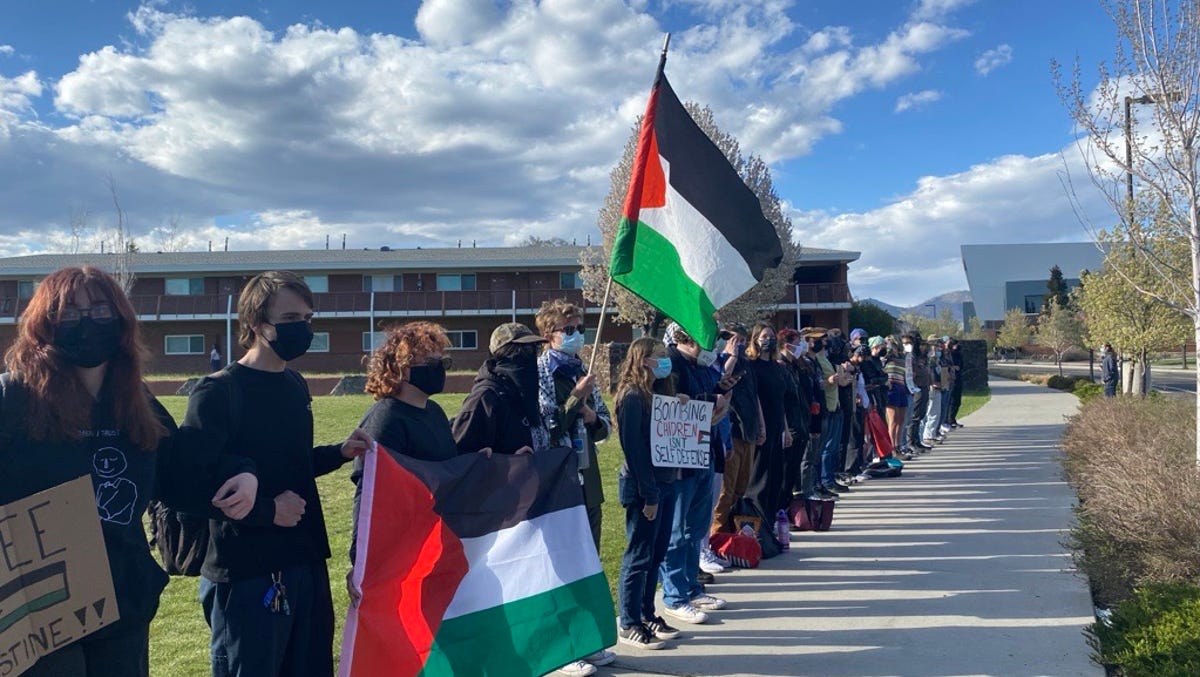World
Photos: Outrage spreads across Middle East after attack on Gaza hospital

Thousands of protesters took to the streets across the Middle East and North Africa on Tuesday to show their outrage in the aftermath of a deadly Israeli air attack on the Al-Ahli al-Arabi Hospital in Gaza.
Spontaneous protests have erupted in Jordan, Turkey, Lebanon, Iran and Iraq, as well as in West Bank cities like Ramallah.
Those demonstrations come in response to the hospital bombing, estimated to be the single deadliest attack since the Israeli-Hamas war began on October 7.
The health ministry in Gaza said at least 500 people were killed as bombs fell on the central Gaza hospital, where displaced Palestinians were sheltering.
Since Israel began pounding Gaza from the air on October 7, tens of thousands of residents seeking refuge from the ongoing bombardment have fled to hospitals for aid and protection.
The World Health Organization condemned Tuesday’s hospital attack and demanded the immediate protection of civilians and healthcare workers in the Palestinian enclave.
But people across Arab nations have also lifted their voices in anger at the devastating scenes emerging from the Al-Ahli al-Arabi Hospital.
Al Jazeera correspondent Dorsa Jabbari reported that “at least half a dozen” cities in Iran have seen protests break out in the wake of the hospital attack.
From her vantage point in the capital Tehran, she explained that demonstrators moved from the city’s Palestine Square to the French Embassy, where they chanted against the violence.
“There is the sense that this was something catastrophic,” Jabbari explained. “The Supreme Leader of Iran spoke earlier on Tuesday and he said once the Muslim countries, the Muslim nation and the people become angry, it is very hard to prevent them from expressing their anger. That is exactly what we’re seeing on the streets of these countries and certainly in Iran as well.”
In Istanbul, meanwhile, freelance journalist Emre Basaran told Al Jazeera the tension was palpable.
“Anti-Israel sentiments have historically been high in Turkey because of its long-standing, decades-long oppression of Palestine and its war against Palestinian people,” he said. “There is a very distinctive anger kind of anger toward Israel right now. You can just feel it, you can just smell it on the street.”
He explained that, after protesters tried to enter the Israeli consulate, Turkish police dispersed the crowd and blocked the area. “There was no way for me to get even close to the consulate,” Basaran said.

World
CBS Fall Schedule: Tracker on Move, Georgie & Mandy Claim Sheldon’s Spot, Matlock Replaces Todd

ad
World
Head of Greek far-right Golden Dawn party is granted early release from prison

The head of Greece’s extreme far-right Golden Dawn party was granted conditional early release from prison Thursday, after serving part of his sentence for running a criminal organization blamed for violent hate crimes.
A council of judges accepted the request by Nikolaos Michaloliakos, 66, who had served the minimal legal requirement for early release. The decision also took into consideration that he was aged over 65, which increases the time he is formally considered to have served. He is in poor health and spent 18 months in pre-trial detention.
GREECE’S FAR-RIGHT GOLDEN DAWN, COUNTER-DEMONSTRATORS, CLASH IN ATHENS
Restrictions imposed on him include a ban on traveling outside the greater Athens region.
Nikos Michaloliakos, the leader of the extreme far-right Golden Dawn political party speaks during a pre-election rally, in Athens, Wednesday, Sept. 16, 2015. The head of Greece’s extreme far-right Golden Dawn party was granted conditional early release Thursday, May 2, 2024, from prison, after serving part of his sentence for running a criminal organization blamed for numerous violent hate crimes. A council of judges accepted the request by Michaloliakos, 66, who had served the minimal legal requirement for conditional release, which also took into consideration his age. (AP Photo/Lefteris Pitarakis)
Michaloliakos and five other former Golden Dawn lawmakers were convicted in October 2020 of running a criminal organization and sentenced to 13 years in prison. Other party members received lesser sentences, following a five-year trial.
Golden Dawn was founded as a Nazi-inspired group in the 1980s and rose to become Greece’s third-largest political party during most of the country’s 2010-2018 financial crisis. Its support later declined, and the party failed to enter parliament post-crisis.
The crackdown on the party followed the 2013 fatal stabbing of a left-wing musician in Athens, for which a Golden Dawn associate was given a life sentence.
Greek political parties and the family of the slain musician expressed dismay at Thursday’s decision.
World
UN, EU, US urge Georgia to halt ‘foreign agents’ bill as protests grow

Thousands gather in Tbilisi to protest against the bill, which passed its second reading in parliament this week.
The European Union, United Nations, and the United States have condemned legislation making its way through Georgia’s parliament on “foreign agents”, as thousands of protesters snarled traffic in the country’s capital Tbilisi on Thursday with a large new protest against the bill.
Protesters poured into Heroes’ Square, a key junction through which much of Tbilisi’s traffic passes between the city’s neighbourhoods. Long queues of vehicles remained blocked.
“We are all together to show the Kremlin’s puppets that we will not accept the government that goes against the Georgian people’s wishes,” said protester Giorgi Loladze, 27, from Kutaisi, Georgia’s third-largest city.
Tens of thousands of protesters had shut down central Tbilisi a day earlier in the largest anti-government rally yet. Police fired tear gas and stun grenades to clear some of them.
The bill – attacked by opponents as authoritarian and Kremlin-inspired – has completed two of three readings in the parliament and the latest comments reflected alarm in both Washington and Brussels over the country’s future direction.
The ruling Georgian Dream party says the law, which would require organisations receiving more than 20 percent of their funding from abroad to register as agents of foreign influence, is needed to ensure transparency.
The party’s billionaire founder said this week that Georgia must defend its sovereignty against Western attempts to dictate to it.
Crowds have protested nightly for weeks outside the parliament in Tbilisi. Inside the building, lawmakers have come to blows.
‘Deeply concerned’
The standoff is seen as part of a wider struggle that could determine whether Georgia, a country of 3.7 million people that has seen war and revolution since the fall of the Soviet Union, moves closer towards Europe or back under Moscow’s influence.
Gert Jan Koopman, director general of the European Commission’s enlargement directorate, reiterated the EU’s warning that the bill would put at risk Georgia’s hopes of becoming a member of the bloc.
“There are concerning developments in terms of legislation. The law … as it stands is unacceptable and will create serious obstacles for the EU accession path,” he told a news conference in Tbilisi.
Koopman said “the ball is very firmly in the court of the government”, adding it still had time to change course.
But the government – which put forward a similar law last year, only to withdraw it in the face of protests – has shown no sign it will climb down a second time, which could be damaging ahead of a parliamentary election in October.
UN rights chief Volker Turk on Thursday called on Georgia’s government to withdraw the bill and expressed concern at police violence against protesters.
The White House also expressed concerns on Thursday about the chilling effect such legislation could have on Georgians’ ability and willingness to express themselves.
“We are deeply concerned about this legislation – what it could do in terms of stifling dissent and free speech,” White House national security spokesman John Kirby said at a US briefing.
Earlier, US Ambassador Robin Dunnigan said the Georgian government’s choices “have moved the country away from its Euro-Atlantic future” and urged it to recommit to integration with the West.
In a statement, Dunnigan said that senior US leaders had invited Georgia to discuss the issue, but that the country had not accepted the offer.
Britain, Italy and Germany have also criticised the bill.
Georgia’s parliament on Wednesday approved the second reading of the bill, which the opposition says is modelled on a law the Kremlin has used to crack down on opponents in Russia.
Parliamentary debates on Thursday were cancelled after what officials called an “attack” on the legislature.
Georgian television on Thursday showed Tbilisi’s Mayor Kakha Kaladze berating a reporter who asked him about police actions at Wednesday’s protest, calling her a “shameless scumbag”.
Lawmakers are expected to give the bill its third and final reading in around two weeks.
-

 News1 week ago
News1 week agoLarry Webb’s deathbed confession solves 2000 cold case murder of Susan and Natasha Carter, 10, whose remains were found hours after he died
-

 World1 week ago
World1 week agoHaiti Prime Minister Ariel Henry resigns, transitional council takes power
-

 News1 week ago
News1 week agoFirst cargo ship passes through new channel since Baltimore bridge collapse
-

 World1 week ago
World1 week agoUS secretly sent long-range ATACMS weapons to Ukraine
-

 World1 week ago
World1 week agoSpanish PM Pedro Sanchez suspends public duties to 'reflect'
-

 News1 week ago
News1 week agoAmerican Airlines passenger alleges discrimination over use of first-class restroom
-

 World1 week ago
World1 week agoAsia bears biggest climate-change brunt amid extreme weather: WMO
-

 Movie Reviews1 week ago
Movie Reviews1 week agoHumane (2024) – Movie Review



















